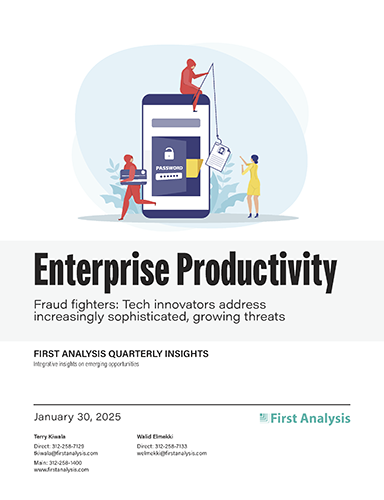Quarterly insights: Enterprise productivity
Fraud fighters: Tech innovators address increasingly sophisticated, growing threats

At several conferences during the fourth quarter, we were astounded by the prominence of fraud as a major challenge for participants and by the proliferation of innovative technologies to combat this growing epidemic.
Traditional fraud prevention efforts that depend on human attention can’t keep pace with the frequency and velocity of today’s financial crimes. Financial institutions and other businesses have concluded they need more advanced tools to combat fraud.
Fraud-fighting businesses are increasingly stepping up to meet this demand in a market expected to grow by more than 20% annually and reach nearly $300 billion by 2032. We briefly profile some of the best ideas we saw among fraud-fighting technology providers at these conferences.
TABLE OF CONTENTS
Includes discussion of 20 private companies
- Signs point to a tougher, bigger fraud problem
- Multi-dimensional costs
- Shortcomings of traditional anti-fraud tools spark new solutions
- Here are some of the companies solving the fraud problem
- Abundant opportunity in battle against fraud
- Tide trends up for the First Analysis Enterprise Productivity Index
- Enterprise productivity M&A: Notable transactions include SafeSend and Zuora
- Enterprise productivity private placements: Notable transactions include Chargezoom and DocJuris
Signs point to a tougher, bigger fraud problem
At several conferences during the fourth quarter, including the National Multifamily Housing Council’s OpTech, Money 20/20, Curql’s Venture Tech, and FOTechHub for family offices, we were astounded by the prominence of fraud as a major challenge for participants and by the proliferation of innovative technologies to combat this growing epidemic.
How did we get to this point?
At the height of the pandemic, the easiest and most reliable tactic for fraudsters was using phony identities to loot government stimulus programs, such as the Paycheck Protection Program, the coronavirus stimulus payment program, and the American Rescue Plan, which provided substantially higher unemployment benefits to individuals.
The Associated Press reported that fraudsters stole $280 billion of COVID-19 relief funds and an additional $123 billion was wasted or misspent. Combined, these amounted to nearly 10% of the $4.2 trillion the federal government disbursed in COVID-19 relief aid. The federal government has prosecuted thousands of criminals in connection with these thefts.

Request full report
To access the full report, please provide your contact information in the form below. Thank you for your interest in First Analysis research.
